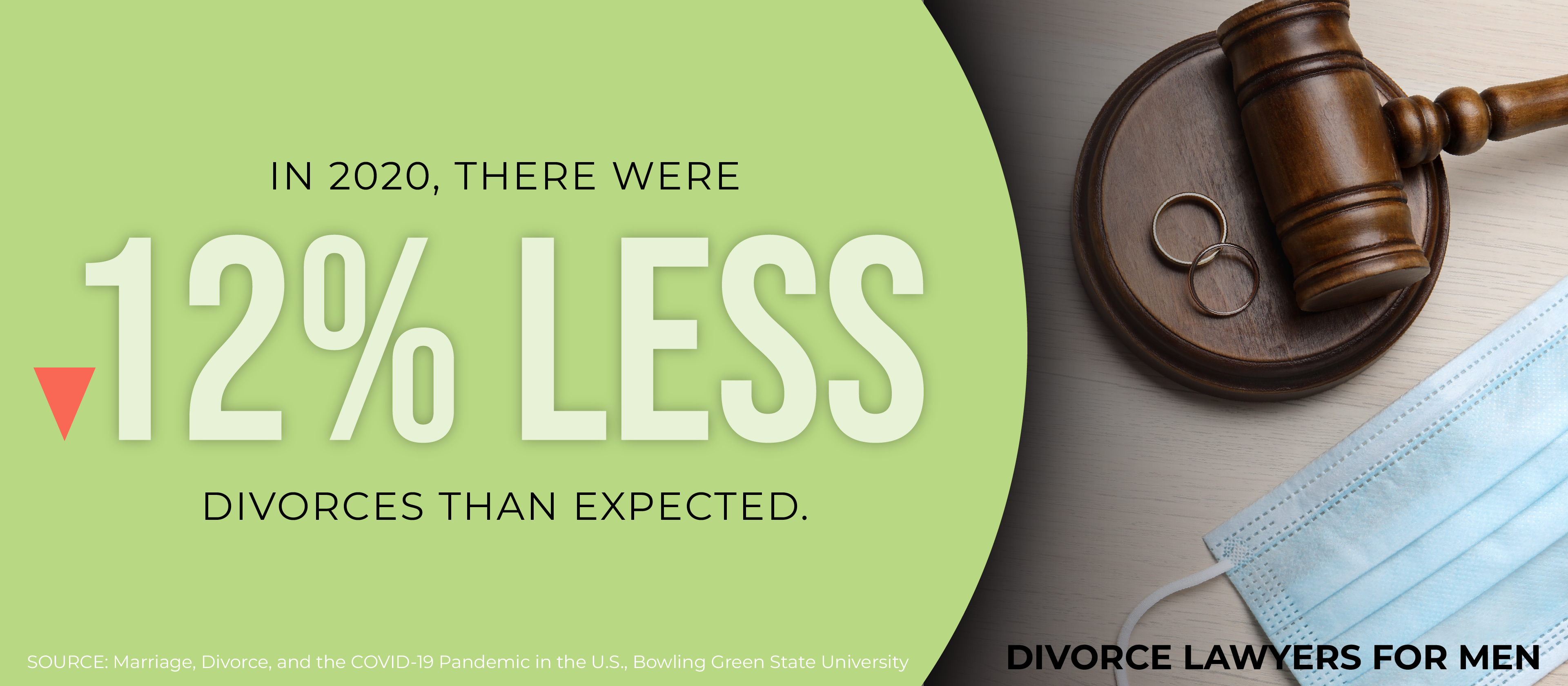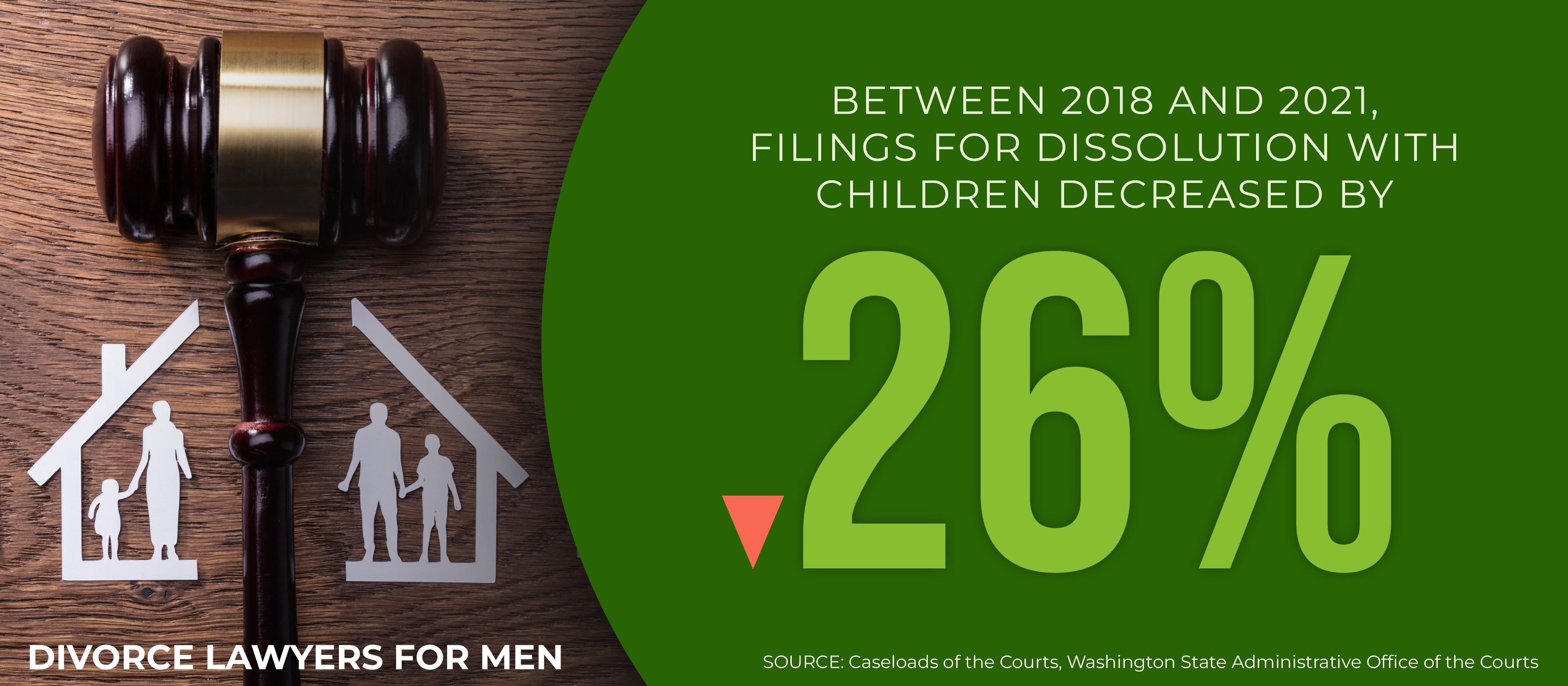While the popular belief going into the early days of the pandemic was that COVID restrictions would dramatically increase the number of divorces nationwide, it seems that the opposite has actually been the case.
According to a Bowling Green State University published study, of the 714,997 divorces expected to occur nationwide in 2020 (based on historical data), the actual number of divorces was only 630,505, a dramatic 12% less than expected.
The down-swing should not be totally surprising as it is simply a continuation of a decrease in the overall number of U.S. divorces seen since 2011. Hand-in-hand with the 12% decrease in 2020 divorces, the U.S. also experienced a 12% decline in marriages over the same time period. We know that these numbers are not inextricably linked because the newly married are usually not the same couples that are being divorced in the same year. However, it can certainly be an identifiable trend. Fewer marriages are likely to lead to fewer divorces.

The initial concern with COVID was that divorce numbers would grow because of people not being able to tolerate extended periods of time confined with their spouses. While that certainly has to be true in some situations, many couples seemed to thrive with the situationally imposed decrease in outside demands and increase in quality family time.
One obvious answer to the question of why both marriage and divorce numbers decreased in 2020 is simply the lack of access.
For marriages, that entailed a lack of available venues and state restrictions on the number of people who were able to gather in one place during the worst days of the pandemic. Divorce was also limited by heavily restricted or nonexistent access to the Courts to pursue civil matters, like divorce, for the majority of 2020 and beyond. So, no matter what action couples wanted to take that year, whether it was to marry or to divorce, they may not have been able to easily do so.
Washington State has also seen a similar steady decline in divorces over the past several years, as reported by the Washington State Administrator of the Courts. However, in 2021, Washington reports 8,461 statewide filings for dissolution with children and 11,198 without children. That compares to 11,480 dissolution filings with children in 2018 and 15,002 without children. Both categories of filings reflect dramatic decreases of 26% and 25% respectively, over that 3 year time frame.

While it has been widely stated that domestic violence filings saw a COVID-related increase, caseload reports show Washington State civil domestic violence filings remained stable with 15,572 filings in 2018 and a slightly lower 11,558 in 2021. That amounts to a 25.78% decrease in DV filings.
Secondary to the concept of an increasing divorce rate due to the initial shutdown and shared isolation caused by COVID, are a plethora of related issues that contributed to both relationship problems and co-parenting challenges with separated or divorced parents.
The effects of the pandemic and its deadly disease rippled into families’ lives and dynamics far more than expected:
While government programs and financial subsidies helped some families survive the immediate financial impact of being out of work, the end of those programs and the significant impact of rising inflation has been a bit of a surprise aftershock to the pandemic. Money problems are always a contributor to marital issues. The tougher the circumstances, the more difficult it is for a marriage to survive—and Americans are currently dealing with some very difficult financial situations.

Already separated and divorced couples are still confronted by the financial impact of inflation. It may be harder for one parent or the other to meet their financial obligations with their children when their budget is getting stretched to the max to cover cost increases. Any of these issues can come to a head and result in litigation to compel compliance with existing court orders or via modification actions based on significant changes in circumstances.
Court systems across Washington continue to be backed up and facing lengthy delays due primarily to pandemic-related issues. Those include a period of a near-total shutdown, followed by an extended period of trying to catch up on backlogs and attempting to make the necessary adjustments to effectively conduct the majority of court activities online. It has been a three-year period of constant adjustment and accommodation. While the Courts have overall been remarkably responsive and successful in dealing with the problems created by the pandemic, the system is still plagued with challenges and inefficiencies.

The pandemic has either created or shared the spotlight with recognition of deeply embedded philosophical and cultural differences in our society. Couples and co-parents are not immune from those issues. Political differences can certainly take a toll on a relationship, particularly if it is already on shaky ground. But issues like schooling from home, vaccination policies, and even the actual belief in the existence of COVID have become the basis for significant disagreements in families, sometimes creating insurmountable and irreconcilable differences.
Co-parents with functioning Parenting Plans suddenly found themselves with dysfunctional plans when schools were not operating as usual and daycare was no longer available. Even now, a couple years later, students are more often kept home from school and daycare sick, requiring a parent to be home with them; school buses often aren’t available due to driver shortages, requiring a parent to be available to drive the kids to school; and daycare is nearly impossible to find, leaving both parents scrambling to be available to cover the gap. What was thought to be a short-term imposition on functional Parenting Plans has now become a long-term issue that co-parents must accommodate by agreement or litigation.

Medical decision making for co-parents has also become a paramount issue for many families. The issue certainly arises when parents do not share the same views on vaccinations and the arguments for and against can become quite heated. However, even what seems like simple decision making, like whether the child(ren) should be wearing a face mask, attending family gatherings, or taking on the risk of travelling, have now become topics of major disagreement between parents.
So, the number of divorces has not increased in the way that many expected. Nevertheless, the pandemic has had a profound effect on families and the practice of family law in ways that few could have predicted.
We will, no doubt, continue to deal with the ramifications of the pandemic for the foreseeable future. Nevertheless, it is somewhat reassuring that we also continue to make inroads into resolving the challenges.
Jeanne Sockle
Jeanne, co-founder and managing partner of Divorce Lawyers for Men, is a successful civil litigator who has focused her legal practice on complex litigation, primarily catastrophic injury and wrongful death lawsuits. She has served as a member and Chair of the Washington State Bar Association Law Clerk Board, as a Thurston County Family Court Child Advocate, and as a founding member of the Thurston County Volunteer Legal Clinic.


